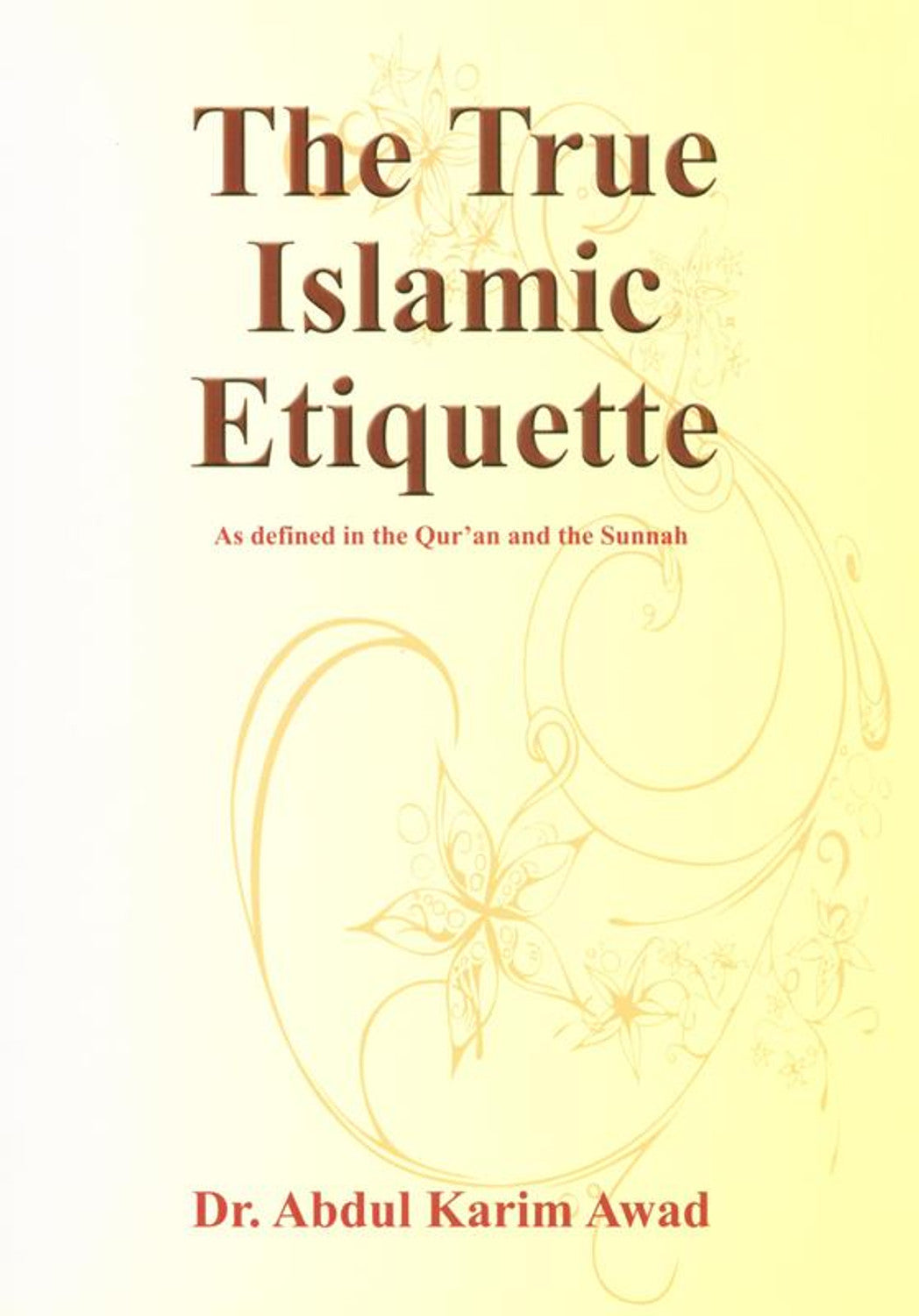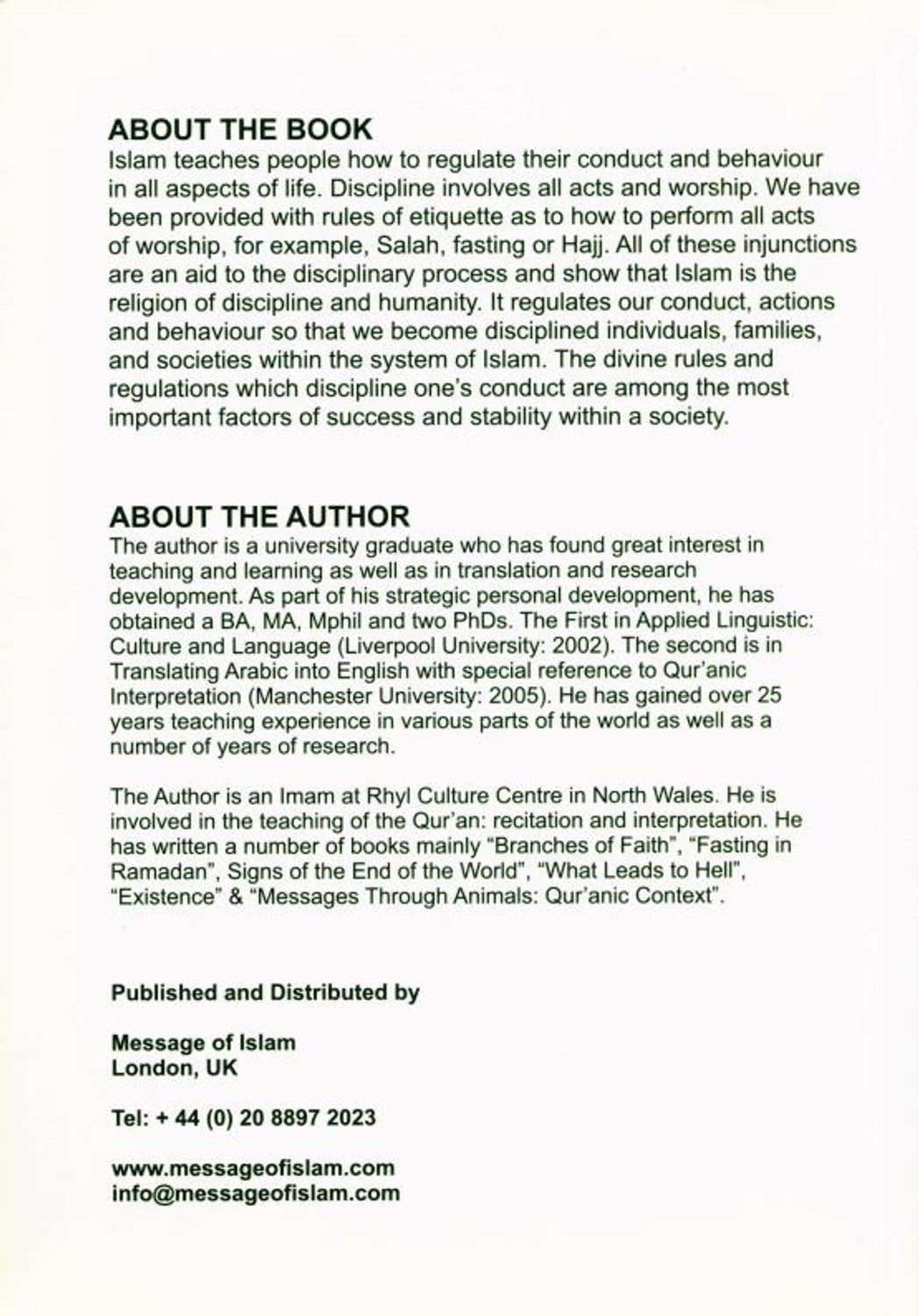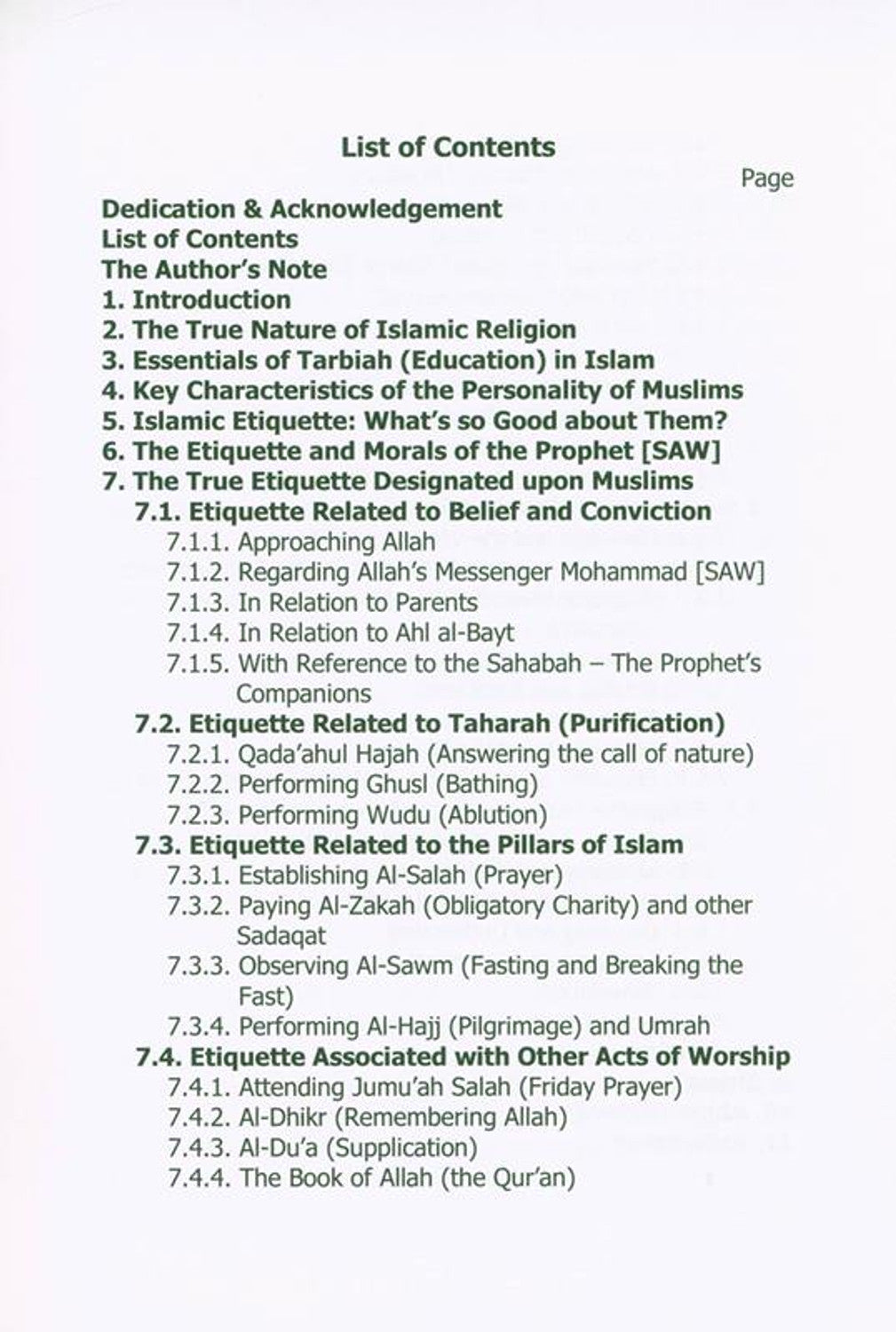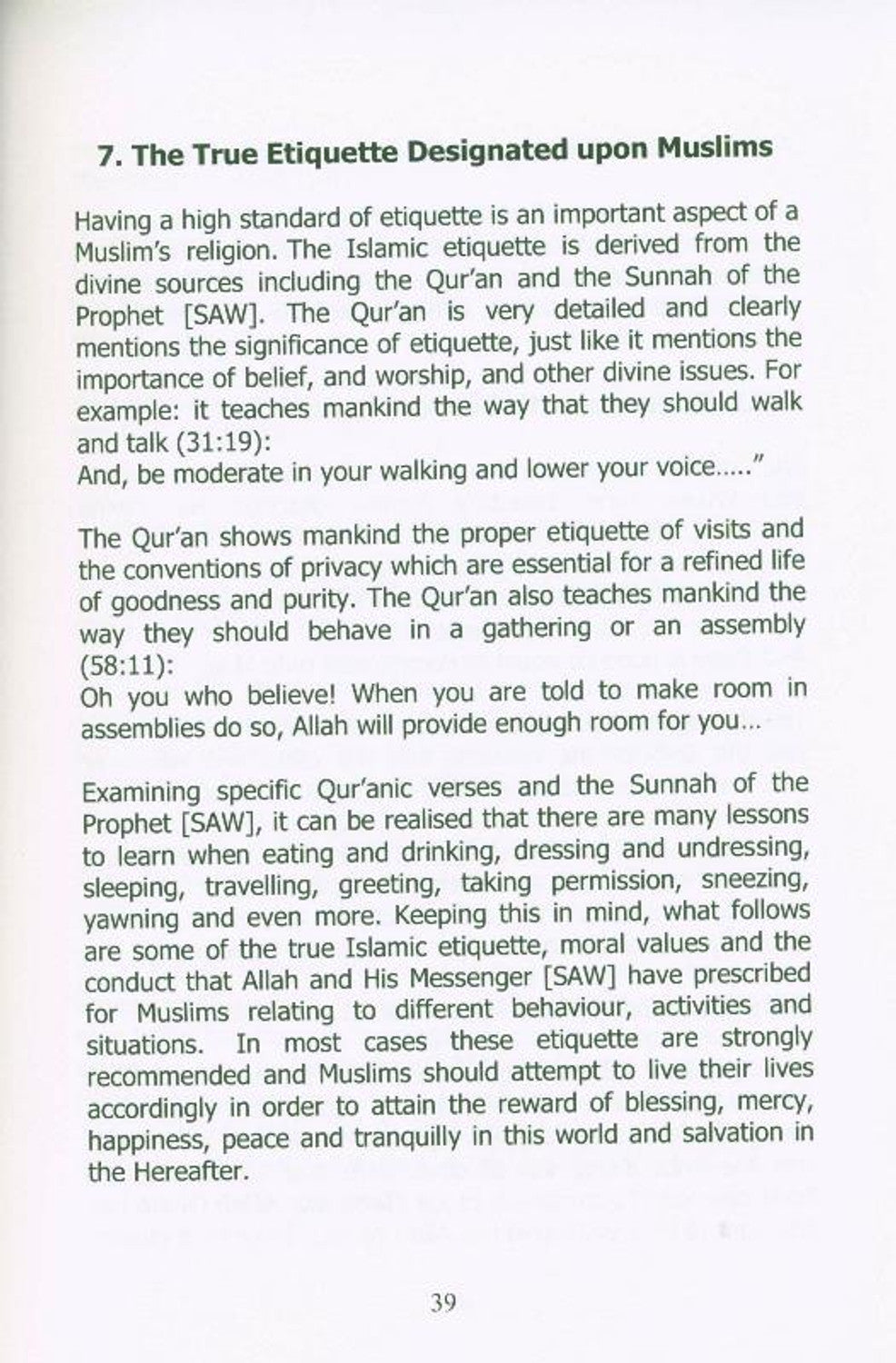The True Islamic Etiquette by Dr Abdul Karim Awad
The True Islamic Etiquette by Dr Abdul Karim Awad
Publisher:
UK Islamic Academy
Author:
Dr Abdul Karim Awad
Language:
English
Binding:
Soft Cover
Pages: 296
Size: 15x21cm
Couldn't load pickup availability




Collapsible content
Description of Book
The True Islamic Etiquette provides a comprehensive guide to the moral and social behaviors emphasized in Islam. It covers essential aspects of daily life, including personal hygiene, greetings, interactions with family and neighbors, and the proper conduct in social, business, and religious settings. Rooted in the Qur'an and Sunnah, this book offers practical advice on embodying the character and manners of a true Muslim. Suitable for both new Muslims and those seeking to refine their understanding of Islamic etiquette, it serves as a valuable resource for fostering respect, kindness, and humility in all aspects of life.
Publisher
UK Islamic Academy
Author
- Dr Abdul Karim Awad
Sample Pages - Content
Page:01
The True Islamic Etiquette
As defined in the Qur'an and the Sunnah
Dr. Abdul Karim Awad
Page:02
Islam teaches people how to regulate their conduct and behaviour in all aspects of life. Discipline involves all acts and worship. We have been provided with rules of etiquette as to how to perform all acts of worship, for example, Salah, fasting or Hajj. All of these injunctions are an aid to the disciplinary process and show that Islam is the religion of discipline and humanity. It regulates our conduct, actions and behaviour so that we become disciplined individuals, families, and societies within the system of Islam. The divine rules and regulations which discipline one's conduct are among the most important factors of success and stability within a society.
Page:03
List of Contents
Page
Dedication & Acknowledgement
List of Contents
The Author's Note
1. Introduction
2. The True Nature of Islamic Religion
3. Essentials of Tarbiah (Education) in Islam 4. Key Characteristics of the Personality of Muslims 5. Islamic Etiquette: What's so Good about Them? 6. The Etiquette and Morals of the Prophet [SAW] 7. The True Etiquette Designated upon Muslims 7.1. Etiquette Related to Belief and Conviction 7.1.1. Approaching Allah
7.1.2. Regarding Allah's Messenger Mohammad [SAW] 7.1.3. In Relation to Parents
7.1.4. In Relation to Ahl al-Bayt
7.1.5. With Reference to the Sahabah - The Prophet's Companions
7.2. Etiquette Related to Taharah (Purification) 7.2.1. Qada'ahul Hajah (Answering the call of nature) 7.2.2. Performing Ghusl (Bathing)
7.2.3. Performing Wudu (Ablution)
7.3. Etiquette Related to the Pillars of Islam 7.3.1. Establishing Al-Salah (Prayer)
7.3.2. Paying Al-Zakah (Obligatory Charity) and other Sadaqat
7.3.3. Observing Al-Sawm (Fasting and Breaking the
Fast)
7.3.4. Performing Al-Hajj (Pilgrimage) and Umrah
7.4. Etiquette Associated with Other Acts of Worship 7.4.1. Attending Jumu'ah Salah (Friday Prayer)
7.4.2. Al-Dhikr (Remembering Allah)
7.4.3. Al-Du'a (Supplication)
7.4.4. The Book of Allah (the Qur'an)
Page:04
The True Etiquette Designated upon Muslims
Having a high standard of etiquette is an important aspect of a Muslim's religion. The Islamic etiquette is derived from the divine sources including the Qur'an and the Sunnah of the Prophet [SAW]. The Qur'an is very detailed and clearly mentions the significance of etiquette, just like it mentions the importance of belief, and worship, and other divine issues. For example: it teaches mankind the way that they should walk and talk (31:19):
And, be moderate in your walking and lower your voice....."
The Qur'an shows mankind the proper etiquette of visits and the conventions of privacy which are essential for a refined life of goodness and purity. The Qur'an also teaches mankind the way they should behave in a gathering or an assembly (58:11):
Oh you who believe! When you are told to make room in assemblies do so, Allah will provide enough room for you...
Examining specific Qur'anic verses and the Sunnah of the Prophet [SAW], it can be realised that there are many lessons to learn when eating and drinking, dressing and undressing, sleeping, travelling, greeting, taking permission, sneezing, yawning and even more. Keeping this in mind, what follows are some of the true Islamic etiquette, moral values and the conduct that Allah and His Messenger [SAW] have prescribed for Muslims relating to different behaviour, activities and situations. In most cases these etiquette are strongly recommended and Muslims should attempt to live their lives accordingly in order to attain the reward of blessing, mercy, happiness, peace and tranquilly in this world and salvation in the Hereafter.
Dr Abdul Karim Awad
Dr. Abdul Karim Awad is a respected Islamic scholar known for his contributions to Islamic studies, particularly in the areas of ethics, social conduct, and religious guidance. His works focus on integrating Islamic principles into daily life, offering practical advice for Muslims seeking to deepen their faith and embody Islamic values in their personal and social interactions




